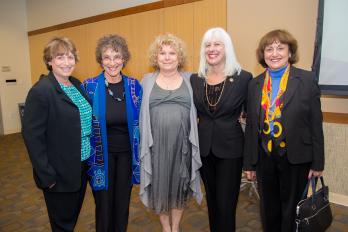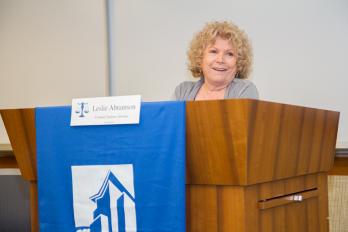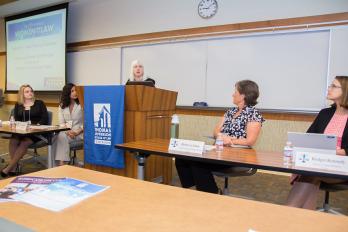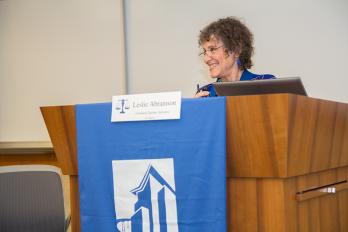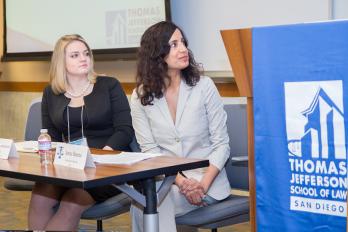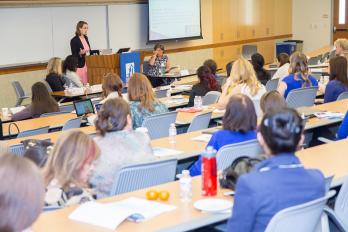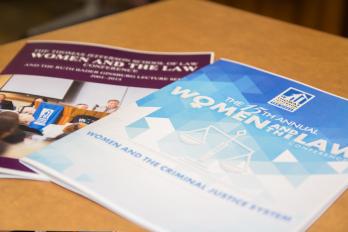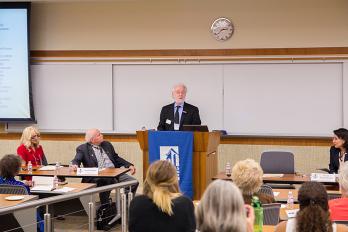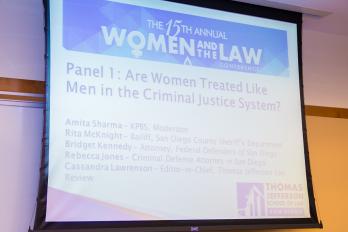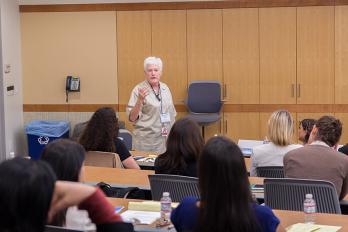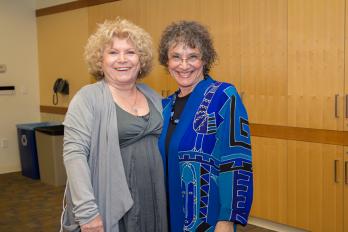Successful Women and the Law Conference Held at TJSL
April 3, 2015
The 15th annual Women and the Law Conference held on Friday, March 27, focused on women and the criminal justice system and created a broad based and relevant dialogue among panelists and attendees.
“Gauging our progress requires looking backwards. Looking at the present and then planning for the future,” said Professor Susan Bisom-Rapp in her opening remarks regarding the need to continually revisit the issues women face in the law and setting the tone for the conference.
The first panel, moderated by KPBS reporter Amita Sharma, explored the ways in which the criminal justice system treats women differently than men. Speakers on the panel included Federal Defenders of San Diego attorney Bridget Kennedy, San Diego criminal defense attorney Rebecca Jones and Editor-in-chief of the Thomas Jefferson Law Review Cassandra Lawrenson. The discussion included women criminal defendants’ ability to successfully incorporate battered person syndrome into their defense and the hurdles women defense attorneys face arguing these types of cases to bodies of decision makers generally made up of men.
Retired criminal defense attorney and author of The Defense is Ready: Life in the Trenches of Criminal Law, keynote speaker Leslie Abramson delivered the Ruth Bader Ginsburg Lecture. Best remembered for representing defendants such as the Melendez brothers and Phil Spector, Abramson candidly talked about the lessons she learned throughout her career as a woman and a defense attorney, “What I think is something necessary to be a great criminal lawyer is something I think women already have, a desire to understand people and human relationships.” As in her book, she admits, “I never thought of myself as much as feminist but as someone with a mindset that they can’t stop me from doing what I want to do, and that’s all there was to it.”
Attendee Maura Kate Benford-Combs said, “Seeing the passion for justice is liberating and invigorating. The quality and caliber of people who are caring and fighting provides a whole different point of view for what is possible with justice. It has reactivated my passion and my belief in people.”
Professor William Slomanson moderated the first afternoon panel, titled “Pathways to Power: Trailblazing Women in Criminal Law”. Panelists gave presentations about the first female attorney on the west coast Clara S. Foltz, the first female Chief Justice Rose Bird, and the first U.S. Supreme Court Justice Sandra Day O’Conner. In addition to the programmed speakers, Professor Slomanson introduced TJSL’s very own Colonel Jane L. Siegel, USMC (Ret.). Adjunct Professor Colonel Siegel’s career is distinguished by a long list of firsts. Among them, Colonel Siegel was the first female court martial judge in the entire Marine Corp and became the first female Regional Defense Counsel at Camp Pendleton, evaluating and observing all Marine defense counsel west of the Rocky Mountains.
“The conference has been fascinating,” said criminal law fellow Martha Youssofi 1L. “I learned about many trail blazing figures I had never heard of and I gained a much better understanding of the impact of the criminal justice system on women.”
The third panel moderated by Professor Julie Greenberg, titled “Women in Prison,” focused on the experience of women in prison and the need for reforms to ameliorate the rippling effects on society. Panelist and former federal prison inmate Adriana Buelna said, “I am overwhelmed to be on such an amazing panel, I wanted to give a voice to women who are locked up and talk about the things that happen in prison.” Buelna voiced great concern for the effects on women’s children while they are in prison, the length of sentences given for nonviolent felonies, and the difficulty transitioning back into society as a former federal felon. Panelist Maya Schenwar, author of Locked Down, Locked Out and Editor-in-chief of Truthout, elaborated on the need to protect children by searching for ways to preserve the mother-child relationship while women are in prison.
San Diego civil rights attorney, Julie Yoo furthered the discussion by explaining the Prison Litigation Reform Act and the obstacles it presents for female inmates attempting to report sexual abuse. “Even though the prior suggestion that there could be consensual sex between prison staff and prisoners is not the standard, it was eye-opening to hear about the brief time limit to file a prisoner’s sexual assault claim and the requirement that a prisoner prove physical injury to move forward,” said attendee Alma Guereque of Yoo’s presentation.
“We’ve been organizing this for months and we’ve had a terrific team who all pitched in and made the conference possible,” said organizer Professor Marjorie Cohn. “The panelists have been top notch and the themes covered are of interest to students, lawyers and the community alike. I am thrilled with the turn out and the discussion during the question and answer period. I hope what we will take from this is not just discussion but real political action to remedy these problems.”
